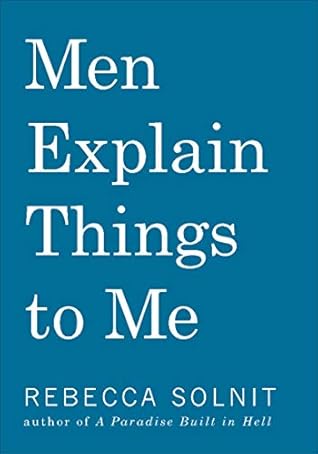More on this book
Community
Kindle Notes & Highlights
Violence is one way to silence people, to deny their voice and their credibility, to assert your right to control over their right to exist.
A Freudian would claim to know what they have and I lack, but intelligence is not situated in the crotch—even if you can write one of Virginia Woolf’s long mellifluous musical sentences about the subtle subjugation of women in the snow with your willie.
Names erased a woman’s genealogy and even her existence.
The woman who is represented is obscured, but the woman who represents is not.
Spiderwebs are images of the nonlinear, of the many directions in which something might go, the many sources for it; of the grandmothers as well as the strings of begats.
To spin the web and not be caught in it, to create the world, to create your own life, to rule your fate, to name the grandmothers as well as the fathers, to draw nets and not just straight lines, to be a maker as well as a cleaner, to be able to sing and not be silenced, to take down the veil and appear: all these are the banners on the laundry line I hang out.
Hope can be the knowledge that we don’t have that memory and that reality doesn’t necessarily match our plans; hope like creative ability can come from what the Romantic poet John Keats called Negative Capability.
I mean Negative Capability, that is, when a man is capable of being in uncertainties, mysteries, doubts,
She is calling for circumstances that do not compel the unity of identity that is a limitation or even repression. It’s often noted that she does this for her characters in her novels, less often that, in her essays, she exemplifies it in the investigative, critical voice that celebrates and expands, and
did my best to kill her. My excuse, if I were to be had up in a court of law, would be that I acted in self-defense . . . Killing the Angel in the House was part of the occupation of a woman writer. The Angel was dead; what then remained? You may say that what remained was a simple and common object—a young woman in a bedroom with an inkpot.
The tyranny of the quantifiable is partly the failure
Ultimately the destruction of the Earth is due in part, perhaps in large part, to a failure of the imagination or to its eclipse by systems of accounting that can’t count what matters. The revolt against this destruction is a revolt of the imagination, in favor of subtleties, of pleasures money can’t buy and corporations can’t command, of being producers rather than consumers of meaning, of the slow, the meandering, the digressive, the exploratory, the numinous, the uncertain. I


